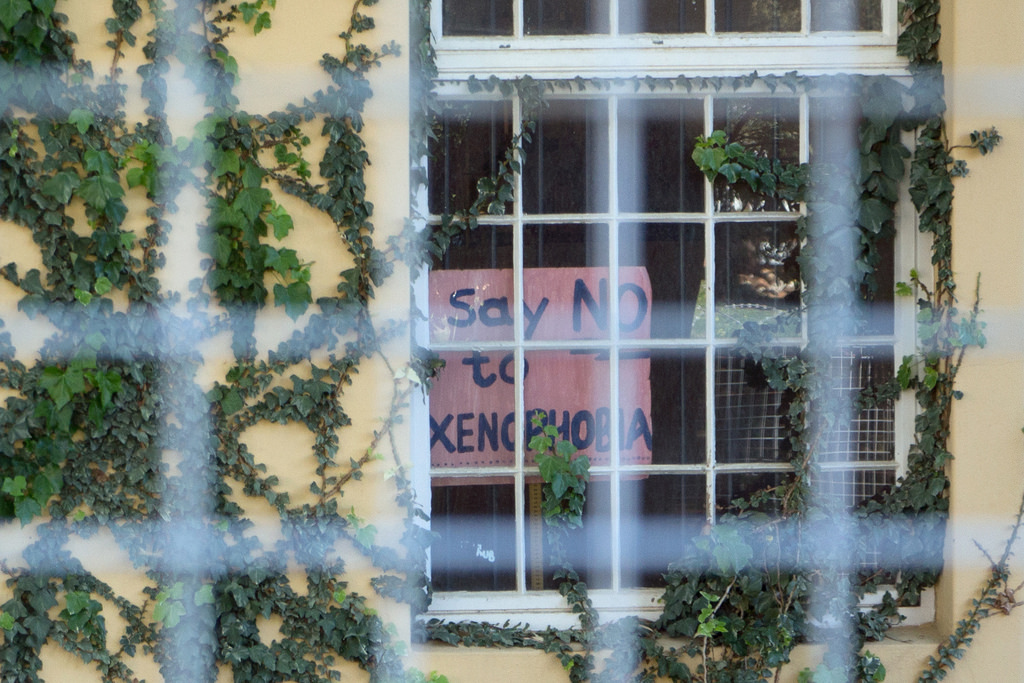"Xenophobia – a matter violating law and morality"
May 19th, 2015 With xenophobia making headlines in South Africa, Denise Juvane, 22, a Commonwealth Correspondent from Mozambique now living in England examines the scope of the issue and looks at potential solutions.
With xenophobia making headlines in South Africa, Denise Juvane, 22, a Commonwealth Correspondent from Mozambique now living in England examines the scope of the issue and looks at potential solutions.
Xenophobic uprising isn’t new in South Africa. Similar attacks to the ones currently occurring also took place in 2008, where at least 60 people were killed.
So, why has room been left for history to repeat itself? Convincingly, the African Solidarity Network noted that long-term programs should be put in place to prevent xenophobic attacks rather than having to deal with them when they occur. Undeniably, this is a fair point to make as conflict prevention rather than the follow up reconstruction is always the safest bet.
My biggest concern towards this issue is the fact that the breach of human rights has been such a continuous occurrence that those who partake in such atrocities see it as completely normal. The Universal Declaration of Human Rights (Article II) clearly states that: “Everyone is entitled to all the rights and freedoms set forth in this declaration, without distinction of any kind, such as race, colour, sex, language, religion, political or other opinion, national or social origin, property, birth and other status”.
Article III follows by stating: “everyone has the right to life, liberty and security of person”. I could continue stating all the articles because they undeniably apply to this issue, but, the main message that I am trying to get across is that with these laws set forth by the United Nations General Assembly, what is then done when they are breached?
Indeed, Chapter VII, Article 39 of Charter of the United Nations addresses the issue of maintenance of peace and the protection of civilians by stating: “The Security Council shall determine the existence of any threat to the peace, breach of the peace, or act of aggression and shall make recommendations, or decide what measures shall be taken in accordance with Articles 41* and 42*, to maintain or restore international peace and security”.
The UNSC (United Nations Security Council) has sole possession of legal intervention and has the power to delegate measures to other bodies, thus, any action performed without UNSC consent automatically makes it an illegal intervention. For this case therefore, does it mean that should the UNSC not deem the issue as priority in the agenda and hence not accredit it intervention status, anything performed outside its authority is deemed as unlawful? Yes. It can be argued so. However, on the other hand, do those countries whose citizens are suffering oppression in the hands of these South African individuals sit back and see their people tortured and killed? No!
Something ought to be done, but to me, this issue runs deeper than just xenophobic behaviour coming from some South Africans. The issue, it seems to me, has always been under the thought of ‘let us oppress those who are different and think and/or behave differently than we do’. I say this – and let us refer to Boko Haram in Nigeria. There is also an oppression of Christians by the Boko Haram group in a bid to implement Islamism and Sharia law. They, too, (the Christians) are oppressed and innocently killed for basically ‘being different’. So no, this issue is not just about South Africa; it is not just about xenophobia. It is highly revolting to continuously see that some individuals possess the ability to carry so much hatred in them. If action is not taken now, then when? When we begin to see a repetition of Rwanda taking place? Or when the xenophobia expands to more than just oppressing other African neighbours but also people of other continents?
Some might also highlight that these South Africans that are committing such crimes (yes, crimes) are forgetting about their oppressive past and mostly, forgetting about what these same people they are mistreating did for the sake of their freedom. To me, yes, that is a plausible point, but not only. It is a matter of morals and ethics. Looking beyond the fact that African nations are known to have helped each other in the fight for independence lies the important aspect of just being moral. To me, that morality is what’s lacking right now.
I believe that beyond taking a moral high ground, further action ought to be taken from international organisations such as the African Union, which is primarily there to maintain peace and security. There also ought to be an avoidance of retaliation, because at the end of the day, two wrongs don’t make a right.
*Article 41: The Security Council may decide what measures not involving the use of armed force are to be employed to give effect to its decision, and it may call upon the Members of the United Nations to apply such measures. These may include complete or partial interruption of economic relations and of rail, sea, air, postal, telegraphic, radio, and other means of communication, and the severance of diplomatic relations.
*Article 42: Should the Security Council consider that measures provided for in Article 41 would be inadequate or have proved to be inadequate, it may take such action by air, sea, or land forces as may be necessary to maintain or restore international peace and security. Such action may include demonstrations, blockade, and other operations by air, sea, or land forces of the Members of the United Nations.
photo credit: Say No to Xenophobia via photopin (license)
…………………………………………………………………………………………………
About me:
I am final year BSc International Politics student at the University of Surrey in England. I am very much interested in international development, the effect of media in international relations and tackling of poverty and inequality. As well as writing for the Commonwealth Correspondent, I am also a blogger and Vice-President of the Portuguese Society at the University of Surrey. www.thoughtsbyjuvane.wordpress.com
………………………………………………………………………………………………………
Opinions expressed in this article are those of the author and do not necessarily represent the views of the Commonwealth Youth Programme. Articles are published in a spirit of dialogue, respect and understanding. If you disagree, why not submit a response?
To learn more about becoming a Commonwealth Correspondent please visit: http://www.yourcommonwealth.org/submit-articles/
…………………………………………………………………………………………………




